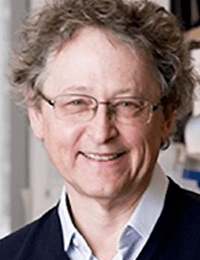The 2022 Harrington Prize for Innovation in Medicine: James E. Crowe, Jr., MD, and Michel C. Nussenzweig, MD, PhD


The ninth annual Harrington Prize for Innovation in Medicine has been jointly awarded to James E. Crowe, Jr., MD, Director, Vanderbilt Vaccine Center and Professor, Departments of Pediatrics and Pathology, Microbiology and Immunology, Vanderbilt School of Medicine, and Michel C. Nussenzweig, MD, PhD, Investigator, HHMI, and Zanvil A. Cohn and Ralph M. Steinman Professor, The Rockefeller University. The award recognizes their groundbreaking work, which has elucidated fundamental principles of the human immune response and enabled the use of human antibodies to treat COVID-19.
The Harrington Prize for Innovation in Medicine, established in 2014 by the Harrington Discovery Institute at University Hospitals and the American Society for Clinical Investigation (ASCI), honors physician-scientists who have moved science forward with achievements notable for innovation, creativity and potential for clinical application.
Dr. Crowe has advanced the discovery of human monoclonal antibodies for many of the most pathogenic viruses that cause human disease. His team has discovered thousands of human monoclonal antibodies for SARS-CoV-2 (the virus that causes COVID-19) and facilitated their development, transferring clinical leads to multiple pharmaceutical partners including tixagevimab + cilgavimab, now in use in high risk patients. His work on the genetic and structural basis of virus neutralization has also revealed important principles that are being exploited in new vaccine and antibody development.
Dr. Nussenzweig addressed a critical issue in immunology – the lack of a detailed understanding of the human antibody response – by developing robust and scalable methods for cloning antibodies from single human B cells. Dr. Nussenzweig showed that antibodies cloned directly from humans can be a safe and effective treatment against viral infections when passively transferred to other humans. His work established a paradigm that made it possible for him and others to rapidly develop monoclonal antibody therapies against SARS-CoV-2.
A committee composed of members of the ASCI Council and the Harrington Discovery Institute Scientific Advisory Board reviewed nominations from leading academic medical centers from eight countries before selecting the 2022 Harrington Prize recipients.
“Drs. Crowe and Nussenzweig are extraordinary physician-scientists who took distinct and separate paths but arrived at the same endpoint. In doing so, they have taught us a great deal about the human immune response and have successfully translated those findings into therapies for patients. The creativity, innovation and clinical impact demonstrated by their work is precisely what The Harrington Prize seeks to recognize,” said Hossein Ardehali, MD, PhD, Professor of Medicine in the Division of Cardiology at Northwestern Medicine and the 2021-2022 President of the ASCI.
“The translational implications of Dr. Crowe’s and Dr. Nussenzweig’s work are quite profound. Their antibody-based therapies have enabled the medical community to more effectively combat COVID, and will spare untold human suffering,” said Jonathan S. Stamler, MD, President, Harrington Discovery Institute, Robert S. and Sylvia K. Reitman Family Foundation Distinguished Professor of Cardiovascular Innovation and Professor of Medicine and of Biochemistry at University Hospitals and Case Western Reserve University.
In addition to sharing the Prize’s $20,000 honorarium, co-recipients Dr. Crowe and Dr. Nussenzweig will deliver The Harrington Prize Lecture at the 2022 AAP/ASCI/APSA Joint Meeting on April 8, will be featured speakers at the 2022 Harrington Scientific Symposium May 25-26, and will co-publish an essay in the Journal of Clinical Investigation.
Since its establishment, The Harrington Prize has recognized outstanding and diverse innovation in medicine:
- 2014: Harry Dietz, MD, Johns Hopkins University, for his contributions to the understanding of the biology and treatment of Marfan syndrome, a disorder leading to deadly aneurysms in children and adults.
- 2015: Douglas R. Lowy, MD, The National Cancer Institute, in recognition of his discoveries that led to the development of the Human Papillomavirus vaccine to prevent cervical cancer.
- 2016: Jeffrey M. Friedman, MD, PhD, The Rockefeller University, for his discovery of leptin, which controls feeding behavior and is used to treat related clinical disorders.
- 2017: Jointly awarded to Daniel J. Drucker, MD, Mount Sinai Hospital, Canada, Joel F. Habener, MD, Massachusetts General Hospital, and Jens J. Holst, MD, DMSc, University of Copenhagen, Denmark, for their discovery of incretin hormones and for the translation of these findings into transformative therapies for major metabolic diseases such as diabetes.
- 2018: Helen H. Hobbs, MD, UT Southwestern Medical Center, for the discovery of the link between a gene mutation (PCSK9) and lower levels of LDL, which has improved the treatment of high cholesterol.
- 2019: Carl H. June, MD, University of Pennsylvania, for advancing the clinical application of CAR T therapy for cancer treatment, and for his sustained contributions to the field of cellular immunology.
- 2020: Stuart H. Orkin, MD, Harvard University, for breakthrough discoveries on red blood cells that offer new treatments for patients with sickle cell disease and beta-thalassemia, which are among the most common genetic disorders.
- 2021: Warren J. Leonard, MD, and John J. O’Shea, MD, NIH, for their respective contributions to the field of immunology, from fundamental discovery to therapeutic impact.
